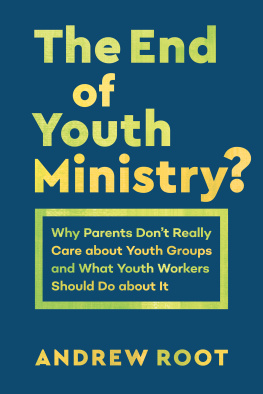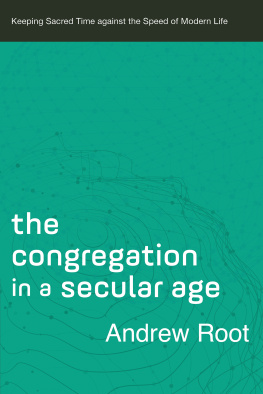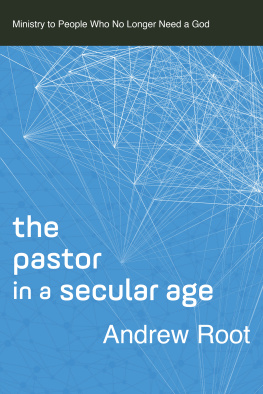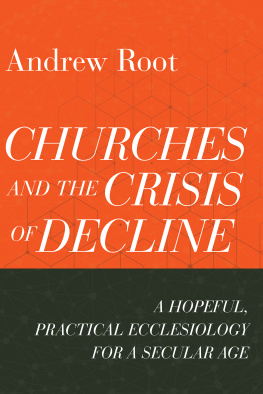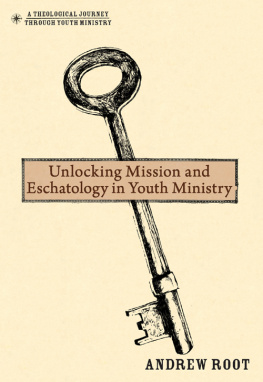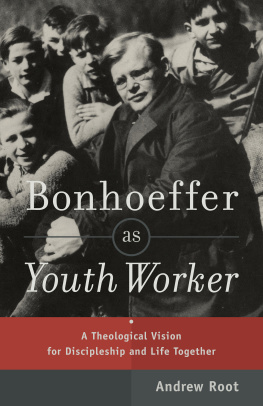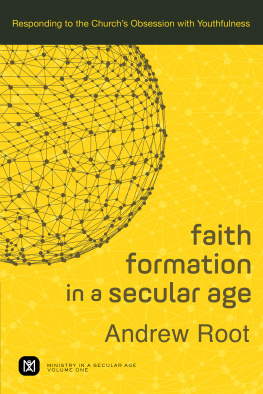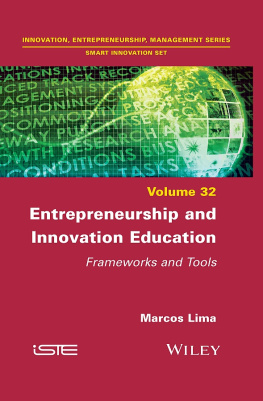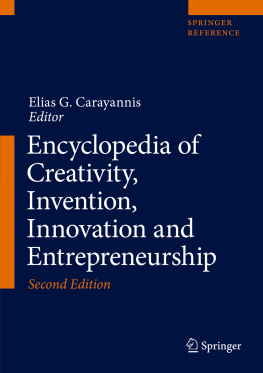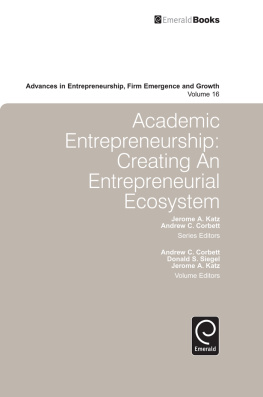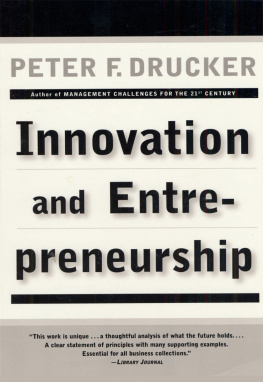Andrew Root - The Church after Innovation--Questioning Our Obsession with Work, Creativity, and Entrepreneurship
Here you can read online Andrew Root - The Church after Innovation--Questioning Our Obsession with Work, Creativity, and Entrepreneurship full text of the book (entire story) in english for free. Download pdf and epub, get meaning, cover and reviews about this ebook. year: 2022, publisher: Baker Publishing Group, genre: Religion. Description of the work, (preface) as well as reviews are available. Best literature library LitArk.com created for fans of good reading and offers a wide selection of genres:
Romance novel
Science fiction
Adventure
Detective
Science
History
Home and family
Prose
Art
Politics
Computer
Non-fiction
Religion
Business
Children
Humor
Choose a favorite category and find really read worthwhile books. Enjoy immersion in the world of imagination, feel the emotions of the characters or learn something new for yourself, make an fascinating discovery.
- Book:The Church after Innovation--Questioning Our Obsession with Work, Creativity, and Entrepreneurship
- Author:
- Publisher:Baker Publishing Group
- Genre:
- Year:2022
- Rating:5 / 5
- Favourites:Add to favourites
- Your mark:
- 100
- 1
- 2
- 3
- 4
- 5
The Church after Innovation--Questioning Our Obsession with Work, Creativity, and Entrepreneurship: summary, description and annotation
We offer to read an annotation, description, summary or preface (depends on what the author of the book "The Church after Innovation--Questioning Our Obsession with Work, Creativity, and Entrepreneurship" wrote himself). If you haven't found the necessary information about the book — write in the comments, we will try to find it.
Andrew Root: author's other books
Who wrote The Church after Innovation--Questioning Our Obsession with Work, Creativity, and Entrepreneurship? Find out the surname, the name of the author of the book and a list of all author's works by series.
The Church after Innovation--Questioning Our Obsession with Work, Creativity, and Entrepreneurship — read online for free the complete book (whole text) full work
Below is the text of the book, divided by pages. System saving the place of the last page read, allows you to conveniently read the book "The Church after Innovation--Questioning Our Obsession with Work, Creativity, and Entrepreneurship" online for free, without having to search again every time where you left off. Put a bookmark, and you can go to the page where you finished reading at any time.
Font size:
Interval:
Bookmark:
This book will help you to consider the possible costs of chasing innovation and entrepreneurshipfor you and your church. By tracing their origins, Andrew Root invites readers to examine the ends and aims of both innovation and entrepreneurship. Rather than helping the church and its congregants to thrive, unreflective practices of innovation and entrepreneurship can shift values and loyalties, and along the way contribute to anxiety, depression, and an overinflation of the self which works against genuine formation of the self in Christ. The Church after Innovation provides significant insights and questions regarding some of the most pressing challenges of our time.
Angela Williams Gorrell , Truett Theological Seminary, Baylor University
Theres something satisfying about a story that is this big, bold, and revealing about how our cultural presumptions came to beespecially when so beautifully told. Roots grand narrative offers the significant benefit of showing in fine-grain detail why Christians who do not account for the shaping effects of our economic practices evacuate the content of the Christian confession. When Christians fall in love with ideas of leadership, innovation, and entrepreneurship, we can be sure they have ignored for too long the secular economic context in which they live and breathe. A timely wake-up call.
Brian Brock , University of Aberdeen
This perceptive and engaging book is a godsend for leaders and pastors seeking to cultivate the life of the church in a contemporary Western context. In a market saturated with quick-fix, innovate-or-die polemics on church growth, Root weaves a more nuanced philosophical and cultural critique of the captivity of innovation in capitalist culture with the theological insights to liberate the creativity we actually need. The tongue-in-cheek real-life stories of people like us struggling with this task humorously but effectively emphasize the real-world need for such a view of innovation and change. This book offers a richer path to help realize a transcendent creativity of epiphany (over innovation) that values people, nurtures personhood, and promotes flourishing for the church in a secular age.
Nick Shepherd , FRSA, Archbishops Council of the Church of England
With penetrating analysis and prophetic force, Root exposes how the false idols of capitalism are being smuggled into the church through the Trojan horses of innovation and entrepreneurialism. Fashionable trends touting church growth are fueling self-absorption and drawing us away from the cross of Christ. This is a bold, necessary, and urgent book.
Richard Beck , Abilene Christian University; author of Hunting Magic Eels: Recovering an Enchanted Faith in a Skeptical Age
Have you ever read a book and thought, This is on point, and I wish I wrote it? Thats what happened to me when I finished The Church after Innovation . Ministers hear so many leadership mantras today: Innovate! Be efficient! Get creative! Time to pivot! Find your voice! Be authentic! In this book, Root reveals these mantras and the engine that generates them to be the problem. They are not the jewelry but the chains that keep the church captive to a soul-sucking culture. Seminaries need to assign this book. Ministers need to read this book. Im grateful to Root for so powerfully articulating the biggest problem facing the churchnamely, our supposed need to innovate.
Tripp Fuller , founder and host of the Homebrewed Christianity podcast
Peppered with real-life examples, The Church after Innovation opens up innumerable pathways of faithful thought and action for our exhausting times. Root is especially adept at exposing and probing the cultural contradictions of neoliberal capitalism, exploring how they have shaped (and warped) the mission of the church and our very selves. Come for that critique and stay for fascinating dives into management theory, the promise of nothingness, the mystics behind Martin Luther, and so much more. This important book is worthy of reading and rereading.
Rodney Clapp , author of Naming Neoliberalism: Exposing the Spirit of Our Age
2022 by Andrew Root
Published by Baker Academic
a division of Baker Publishing Group
PO Box 6287, Grand Rapids, MI 49516-6287
www.bakeracademic.com
Ebook edition created 2022
All rights reserved. No part of this publication may be reproduced, stored in a retrieval system, or transmitted in any form or by any meansfor example, electronic, photocopy, recordingwithout the prior written permission of the publisher. The only exception is brief quotations in printed reviews.
Library of Congress Cataloging-in-Publication Data is on file at the Library of Congress, Washington, DC.
ISBN 978-1-4934-3835-8
Baker Publishing Group publications use paper produced from sustainable forestry practices and post-consumer waste whenever possible.
To Nancy Lee Gauche
with gratitude
for the years of our work together

Endorsements
Title Page
Copyright Page
Dedication
Preface
1. Only the Creative Survive: How Mission Became Married to Innovation
2. Were All Sandwich Artists Now: Work and Backwash, Reversing a Historical Flow
3. Hungry, Hungry Markets: Workers in Contradiction, Children in Consumption
4. Lets Get Extra: Exploring the Secular Contradiction of Capitalism
5. Leave It to Management: Managing for Permanent Innovation
6. The Viennese Worm That Exposes the True Self: When Work Becomes about Flexible Projects
7. Justification by Creative Works Alone: When Creativity Becomes King, the Self Becomes a Star
8. Why Youre Not That Special but Feel the Need to Be: Singularity and the Self
9. Standing Naked against Money
11. Aesthetic Epiphanies, Mad Poets, and a Humble Example of What This All Looks Like
Index
Back Cover
(Dont Skip! Read Before Using)
In our familys best moments, our dinner table is a philosophical workshop. We once held a long debate about what makes something a chip. Owen was claiming that gluten-free chips were not real chips. We wondered what elements or components make something the thing it is. We all like to think about where things come from. Once, as we were eating birthday cake, Maisy, at thirteen, wondered about the origin of the phrase You cant have your cake and eat it too. She mentioned that it was nonsensical. She had her cake and she was eating too. She offered to us that it would be better if the phrase were You cant have your cake and eat it twice, which is basically what the phrase means. During that dinner we talked for nearly an hour about cake and possession and the loss of something even when having it. We were all, to different degrees, mesmerized by where things come from.
This book is born from that same inclination. If there is a popular or important new emphasis in Protestantism, its innovation. Everyone seems to be talking about innovation. Innovation is popping up everywherecongregations, denominations, colleges, foundations, camps, parachurch ministries. Institutions and leaders across the church have innovation fever. And why not? Innovation seems exciting, a way to infuse verve back into waning institutions, a way to embrace creativity and to be proactive. After all, innovation and entrepreneurship, along with creativity, are superstars of business, particularly in Silicon Valley.
Before the church baptizes innovation as the answer to its problems (or design ideation as the way to uncover new church practice), we should ask where innovation and entrepreneurship come from. Nothing comes from nowhere. All perspectives, ideas, and practices have deep and rich moral codes hidden within; they all have a history. This book seeks to excavate innovation and entrepreneurship so that those advocating or using innovation and entrepreneurship in the church can know where these ideas come from and what they are tied to. The reader should beware that this book is only a first step. In this project I wear my cultural philosophy hat more securely than my theologians hat. This book is interpretivewhere did innovation come from and what moral visions of the self does it deliver? I cant really solve all the problems I raise. This is only a beginning step. Other projects and people will need to pick up where I leave off. This project fronts some questions for engagement if innovation is to avoid creating more problems than it promises to solve for the church.
Font size:
Interval:
Bookmark:
Similar books «The Church after Innovation--Questioning Our Obsession with Work, Creativity, and Entrepreneurship»
Look at similar books to The Church after Innovation--Questioning Our Obsession with Work, Creativity, and Entrepreneurship. We have selected literature similar in name and meaning in the hope of providing readers with more options to find new, interesting, not yet read works.
Discussion, reviews of the book The Church after Innovation--Questioning Our Obsession with Work, Creativity, and Entrepreneurship and just readers' own opinions. Leave your comments, write what you think about the work, its meaning or the main characters. Specify what exactly you liked and what you didn't like, and why you think so.


